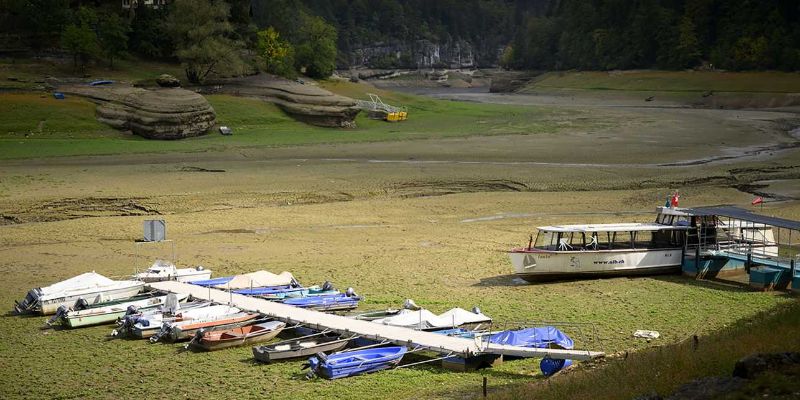A dry wake-up call
Dried-out rivers and soils throughout Europe. Crop losses, devastating forest fires and rapidly melting glaciers. Thousands of deaths caused by extreme heat in cities, cows being slaughtered because of too dry mountain pastures. That was the 2022 summer – one of the hottest and the driest since records began. If climate researchers had warned in spring that we could experience such an extreme summer, we would have been branded as alarmists. But what we are facing is fully consistent with the expert assessment of the Intergovernmental Panel on Climate Change (IPCC)1.
We’ve long been aware of what we were heading towards, and for some years now we’ve been seeing the first clear signs that we won’t be able to overcome the increasing climate crisis without taking serious mitigation measures. For decades, climate change has been trivialised by many as a distant challenge that we would be able to adapt to without any issues. These last few months have shown us that the reality is very different.
Adaptation alone is not an option
We are in a climate crisis. The atmosphere has already heated up by 1.2°C. Rising temperatures and lack of rain dried out soils across the Northern Hemisphere this summer (see ETH-News: Climate change made the 2022 summer droughts more likely, 06.10.2022). We have found that these drought conditions are now to be expected around once every 20 years given the current climate – while without human-induced global warming, they would happen about once every 400 years. The combination of heat and drought also caused problems in many parts of Switzerland – even our water-rich country is not immune to water shortages. Especially since the ice reserves in the Alps are shrinking at a record pace.
If the Earth continues to heat up, we can expect even stronger and more frequent extreme events in the future than what we have seen in recent years: heatwaves, drought, heavy rains and extreme hurricanes. The latest IPCC report also shows that we will quickly reach limits to adaptation if no countermeasures are taken.
One thing is clear: every additional emitted ton of CO2 heats up our extreme climate further. To avoid this, we need a radical phase out of oil, gas and coal – and we need this to happen as quickly as possible. Because every additional tenth of a degree matters.
Change is possible
Phasing out fossil fuels as required is feasible: there are alternatives in almost all sectors – renewable energies, heat pumps, electromobility. In Switzerland, 93% of CO2 emissions come from burning oil and gas. If Switzerland manages to halve its CO2 emissions by 2030, we would already be on track to meet the Paris climate target, which aims to stabilise warming at around 1.5°C. To achieve this, we must reduce our oil and gas consumption by 55% by 2030.
The recently passed “Federal Act on Climate Protection Goals, Innovation and Strengthening Energy Security”2 will pave the way for net-zero CO2. However, individuals, companies and authorities can already start taking the initiative to accelerate the needed change.
Switzerland will also benefit from phasing out fossil fuels in geopolitical terms, as it will be able to reduce its dependence on exports from autocratic regimes. Our reliance on oil and gas does not only harm the climate, it is also costly and leaves democracies vulnerable to blackmail by rogue states.
We will have to live with the climate consequences caused so far. They will not disappear in a net-zero world. In the best-case scenario we can stabilise global warming, but we can hardly reverse it. When it comes to climate, there is no turning back: many consequences are irreversible.
A dry wake-up call for water-rich Switzerland
This summer has clearly shown us how the climate is becoming more extreme year after year. We can work to counteract this, both globally and in Switzerland. Acting now will pay off. The 2022 summer should be a wake-up call for all of us.
